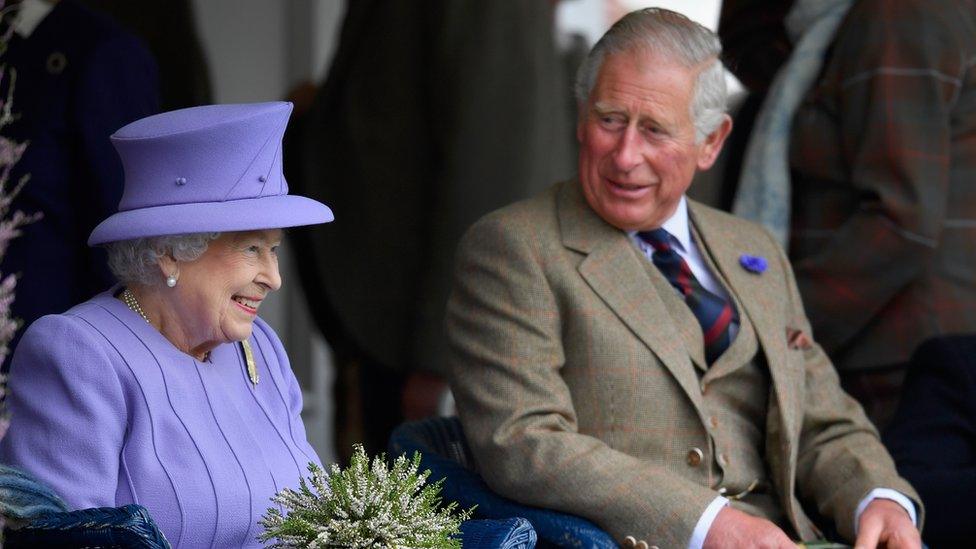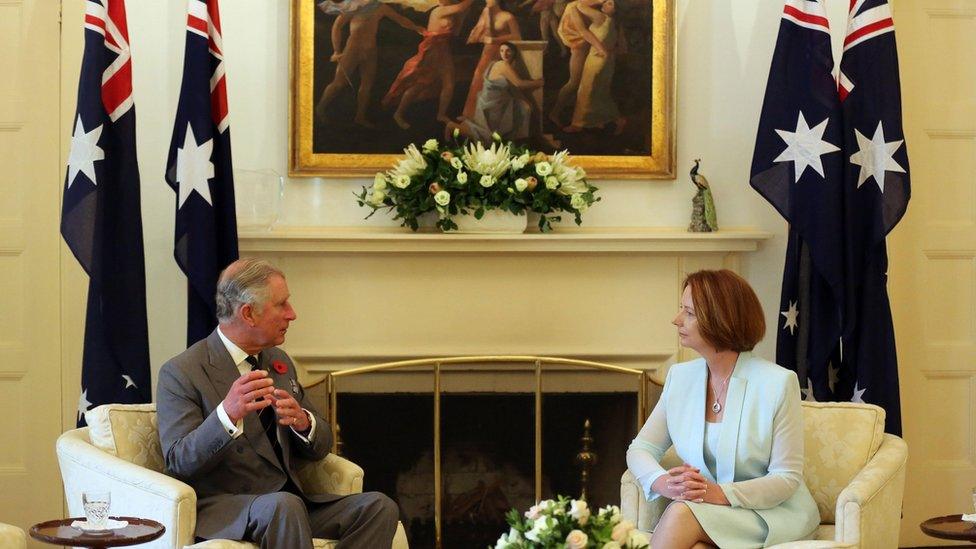Queen lobbies for Prince Charles to be Commonwealth head
- Published

The Queen has been working in private to ensure the Prince of Wales succeeds her as head of the Commonwealth, it has emerged.
It is a responsibility she says she has cherished - but it is not a responsibility that her son and heir will inherit automatically.
While Prince Charles is destined to be head of state of 16 countries, he is reliant on Commonwealth leaders wanting him to replace his mother, and when the time comes other candidates could emerge as potential challengers.
We now know that the Queen sent her most senior and most trusted adviser, Sir Christopher Geidt, to Australia in February 2013 to seek to avoid a contest.
He spoke with the country's then prime minister - a republican, Julia Gillard - in Adelaide in a meeting that lasted half an hour.
Sir Christopher, a man who abhors publicity, had flown there in secret to press the case for the Queen's eldest son to both succeed his mother as King of the UK and Australia, and as head of an organisation which contains 30% of the world's population.
Ms Gillard was the then chair of the Commonwealth, and she was a receptive audience.

Ms Gillard recently said there was "wisdom" in her decision to discuss Charles's possible future role
A month later in March 2013, she paid tribute to the "distinguished" service of the Queen as head of the Commonwealth.
Ms Gillard went on to tell the Australian parliament: "The institution of the head of the Commonwealth, standing as it does above individual governments, has been an asset of the Commonwealth since its foundation, and we need not be reticent about its future.
"For Australia's part, I am sure the Queen's successor as monarch will one day serve as head of the Commonwealth with the same distinction as her Majesty has done."
Three years ago I wrote on this website that this was a clear and striking statement indicating that Prince Charles would be the next head of the Commonwealth.
I didn't know then what had been going on behind the scenes.
I now know, because of a recent speech Julia Gillard delivered on the future of the Commonwealth.
She told her audience in London: "I would not want you to think this was some simple act of colonial subservience. I did see wisdom in it."
Ms Gillard also drew attention to what was said by the UK government about Sir Christopher when he received one of his two knighthoods in 2014: "He has brought to this key role a new approach to constitutional matters, including at the time of the formation of the coalition government, the preparation for the transition to a change of reign and relations with the Commonwealth."
'Worrying for the Commonwealth'
Responding to the former prime minister's account of the 2013 talks in Adelaide, Buckingham Palace said there was nothing unusual about the private secretary meeting the chair of the Commonwealth in advance of a Commonwealth Heads of Government summit.
A spokesman said Sir Christopher wished to inform Ms Gillard in person that the Queen would miss that year's summit in Sri Lanka, and would be represented by her eldest son.
But Professor Philip Murphy, director of the Institute of Commonwealth Studies, told the BBC it was "worrying for the Commonwealth" that this issue was being decided behind closed doors.
"There needs to be a proper and open debate about the future of the headship and about whether, in the 21st century, a British hereditary monarch would be a suitable symbol for the Commonwealth."
All of this matters, of course, because Prince Charles won't automatically take on the symbolic Commonwealth role. The heads of government of the 53 member countries will have to decide once the prince becomes King.